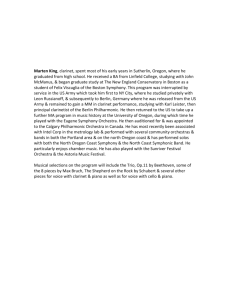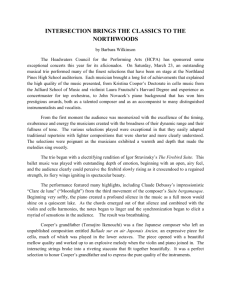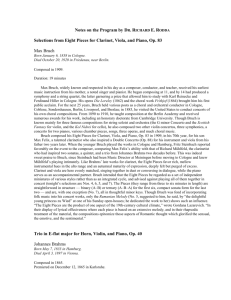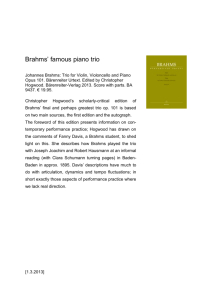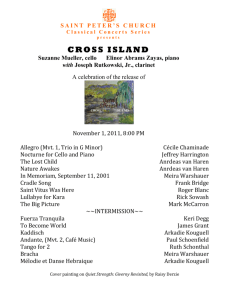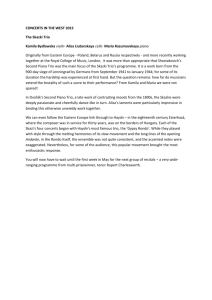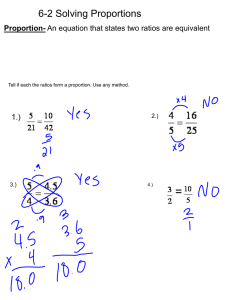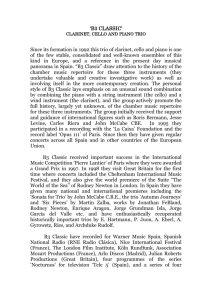CMS 1-29 and 1-31 - The Chamber Music Society of Lincoln Center
advertisement
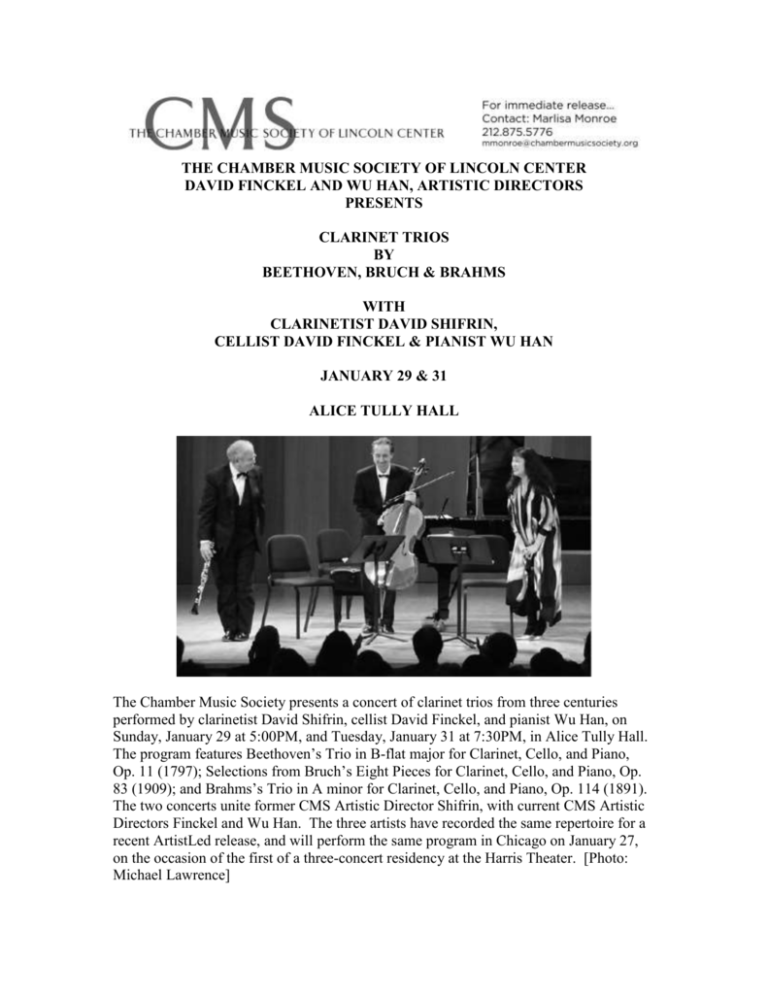
THE CHAMBER MUSIC SOCIETY OF LINCOLN CENTER DAVID FINCKEL AND WU HAN, ARTISTIC DIRECTORS PRESENTS CLARINET TRIOS BY BEETHOVEN, BRUCH & BRAHMS WITH CLARINETIST DAVID SHIFRIN, CELLIST DAVID FINCKEL & PIANIST WU HAN JANUARY 29 & 31 ALICE TULLY HALL The Chamber Music Society presents a concert of clarinet trios from three centuries performed by clarinetist David Shifrin, cellist David Finckel, and pianist Wu Han, on Sunday, January 29 at 5:00PM, and Tuesday, January 31 at 7:30PM, in Alice Tully Hall. The program features Beethoven’s Trio in B-flat major for Clarinet, Cello, and Piano, Op. 11 (1797); Selections from Bruch’s Eight Pieces for Clarinet, Cello, and Piano, Op. 83 (1909); and Brahms’s Trio in A minor for Clarinet, Cello, and Piano, Op. 114 (1891). The two concerts unite former CMS Artistic Director Shifrin, with current CMS Artistic Directors Finckel and Wu Han. The three artists have recorded the same repertoire for a recent ArtistLed release, and will perform the same program in Chicago on January 27, on the occasion of the first of a three-concert residency at the Harris Theater. [Photo: Michael Lawrence] Beethoven’s Clarinet Trio (1798) was intended to please the drawing-room sensibilities of the Viennese public. The review that appeared in the Allgemeine Musikalische Zeitung is typical in its mixture of praise and caution of many that Beethoven received throughout his life: “This Trio is by no means easy, but it runs more flowingly than much of the composer’s other work, and produces an excellent ensemble effect. If the composer, with his unusual grasp of harmony, his love of the graver movements, would aim at natural rather than strained or recherché composition, he would set good work before the public, such as would throw into the shade the stale, hurdy-gurdy tunes of many a more talkedabout musician.” Beethoven, of course, paid no attention to this advice, and went on to become, well, Beethoven, but this early Clarinet Trio, though fitted with a number of harmonic audacities, is music still well within the Classical mold, untroubled by the searching expression of his later works. Max Bruch was widely known and respected in his day as a composer, conductor, and teacher. Though his catalogue numbers more than 100 compositions, he is most widelyknown for three works for string soloist and orchestra: the G minor concerto and Scottish Fantasy for violin, and the Kol Nidrei for cello. Among the lesser known works is the Eight Pieces, Op. 83 (1909) for Clarinet, Cello (originally viola), and Piano. He wrote the work for his son, Max Felix, a talented clarinetist. Like Brahms’s late works for clarinet, the Eight Pieces favor rich, mellow instrumental hues in the alto range and an autumnal maturity of expression, deeply felt but purged of excess. Clarinet and cello are here evenly matched, singing together in duet or conversing in dialogue, while the piano serves as an accompanimental partner. Bruch intended that the Eight Pieces be regarded as a set of independent miniatures of various styles rather than as an integrated cycle, and advised against playing all of them together in concert. “The Eight Pieces are the product of one aspect of the 19th-century cultural climate,” wrote musicologist Gordana Lazarevich. “In their display of lyrical effusiveness where each piece is based on an extensive melody, and in their rhapsodic treatment of the material, the compositions epitomize those aspects of Romantic thought which glorified the sensual, the emotive, and the sentimental.” By late 1890, Brahms had resigned himself to the idea that he would never compose anything again. It was not long thereafter that upon hearing a performance by clarinetist Richard Mühlfeld, the composer was compelled to once again take up his pen. In the summer of 1891 he wrote the Trio in A minor for Clarinet, Cello, and Piano, Op. 114, and the Quintet for Clarinet and Strings, Op. 115, followed three years later, by two Sonatas for Clarinet and Piano, Op. 120. Both the Trio and the Quintet are autumnal in mood, tinged throughout with the bittersweet nostalgia that marked the music of the composer’s full maturity, a quality to which the darkly limpid sonority of the clarinet is perfectly suited. Listing Information: The Chamber Music Society of Lincoln Center at Alice Tully Hall Sun., Jan. 29, 5:00PM & Tues., Jan. 31, 7:30PM Tickets: $65-$27 available at the box office; by calling 212.875.5788; on-line: www.ChamberMusicSociety.org Student Rush $10 BEETHOVEN/BRUCH/BRAHMS David Shifrin, clarinet; David Finckel, cello; Wu Han, piano BEETHOVEN Trio in B-flat major for Clarinet, Cello, and Piano, Op. 11 BRUCH Selections from Eight Pieces for Clarinet, Cello, and Piano, Op. 83 BRAHMS Trio in A minor for Clarinet, Cello, and Piano, Op. 114 ******
